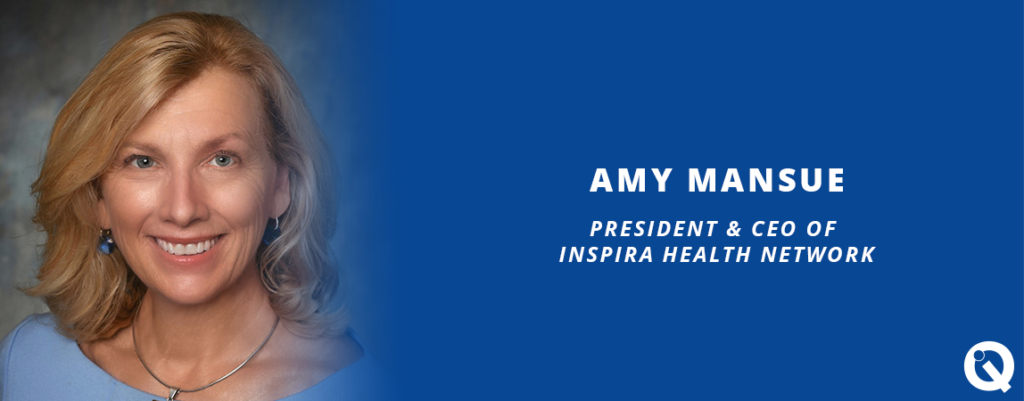Amy Mansue is the President and CEO of Inspira Health, a member of the Quality Institute’s Provider Council, System Level.
You stepped into the leadership role of Inspira Health in September of last year. What are your top priorities for improving quality and patient safety?
The organization has been on a High Reliability journey for five years. There is a strong foundation to build upon. As the CEO, I have the opportunity to partner with all areas of our organization to drive safety and quality to the next level. We have all been using, SBAR, (Situation-Background-Assessment-Recommendation), a tool that provides a framework for communication among members of the health care team about a patient’s condition. It forces all of us to really talk as nurses, as doctors, as other professionals … to condense our thoughts and provide clarity about what we need and what our recommendations are. That goes to the heart of safety, doesn’t it?
Our Board of Directors has approved the next step in our High Reliability journey. We’ve already reduced our serious safety events by 85 percent in the past five years and our challenge by 2025 is to reduce them another 85 percent on our way to zero harm. It’s important that we all see ourselves as part of safety, not just the clinicians.
You took over as CEO in Septemberright before the second surge of the COVID pandemic. How is the pandemic changing how you provide care to your patients?
Thankfully, we know so much more about the virus now than in the first surge, though that does not make the devastation any less painful. I would say a critical element for a CEO is to make sure you’re continuing to focus on strategic issues. When this is over — whatever over means — you can continue to right the ship. People forget that two thirds of our hospital beds are being filled with people who do not have COVID. All the attention is on COVID, but the work here continues. We are seeing people come in sicker and sicker because they are delaying care because of COVID. There are two things that I worry about: the emotional and physical toll the pandemic is taking on our team members, and patients who are not getting the care they need. For instance, our breast screening early detection is down 50 percent from last year. We already are seeing the repercussions of people delaying care.
You served as Chief Experience Officer of RWJBarnabas, an academic health care system in New Jersey with more than 34,000 employees, 9,000 physicians, and 11 acute care hospitals. What are you thoughts about your transition to Inspira Health, a very different type of organization with 1,300 physicians and more than 6,000 employees.
At Inspira, when patients come in, they are family members to our employees. They live in the same neighborhood and often grew up together. Our service area includes two of the poorest counties in the state: Salem County and Cumberland County. It’s very personal and it’s a very personal connection in how we deliver care and the things that we care about. When people say, ‘You’re one of the last independent health systems freestanding. Is that going to change?’ What I say is that the Board of Directors has made a deep commitment to the community and to remaining independent. The reason for that is because no one will love those communities as much as we do. When you have to balance business decisions about who gets what and you are in our demographic, we have to ensure our communities continue to have access to needed services.
You mentioned supporting the physical and mental health of your hospital staff members. What are you doing to support them?
Our behavioral health program prioritizes appointments for our employees. Telehealth has been a wonderful opportunity in behavioral health. It makes it so much easier than having to go to an office and meet with somebody face to face. Our no-show rate is non-existent in behavioral health right now. Second, we have a dedicated resilience committee that is working with employees who are saying, ‘These are the things we need, and these are the tools that we need.’ We’ve been building a toolbox of how best to address those issues for people and responding in real time. And then we make available the resources that we know exist in the state and nationally. We know our employees want to remain strong for their leaders and their patients. We have our supervisors say, ‘You need to do this. I’m worried about you.’ We are not talking about 52 sessions of therapy. Maybe it’s just a month. And this may be my social work background, but I spend a lot of time just walking around on a regular basis, all hours of the day and night, just to be able to say thank you for all the work everyone is doing and to just check in. And our senior leadership meets regularly to focus on this.
We like to ask people something about themselves outside of work. Can you tell us where we might find you on one of your days off?
You might see me at Shop Rite buying ingredients. I like to cook at home. That’s one of the things that brings me joy and that I like to do in my downtime. I am an only child with elderly parents. So my weekend is time to spend with them and do all the things you do as an adult child with parents who are 91 and 83.

